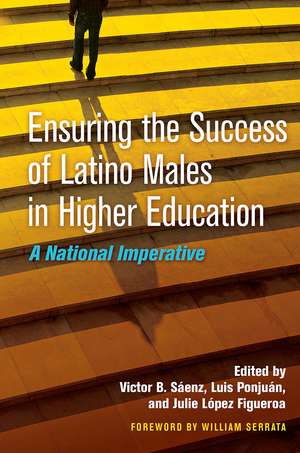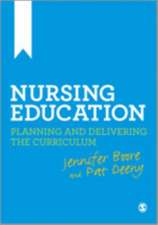Ensuring the Success of Latino Males in Higher Education: A National Imperative
Editat de Victor B. Sáenz, Luis Ponjuán, Julie L. Figueroaen Limba Engleză Paperback – 20 ian 2016
| Toate formatele și edițiile | Preț | Express |
|---|---|---|
| Paperback (1) | 319.88 lei 43-57 zile | |
| Taylor & Francis – 20 ian 2016 | 319.88 lei 43-57 zile | |
| Hardback (1) | 1001.87 lei 43-57 zile | |
| Taylor & Francis – 2 feb 2016 | 1001.87 lei 43-57 zile |
Preț: 319.88 lei
Nou
Puncte Express: 480
Preț estimativ în valută:
61.21€ • 64.08$ • 50.65£
61.21€ • 64.08$ • 50.65£
Carte tipărită la comandă
Livrare economică 07-21 aprilie
Preluare comenzi: 021 569.72.76
Specificații
ISBN-13: 9781579227883
ISBN-10: 1579227880
Pagini: 272
Dimensiuni: 152 x 229 x 20 mm
Greutate: 0.38 kg
Ediția:1
Editura: Taylor & Francis
Colecția Routledge
Locul publicării:Oxford, United Kingdom
ISBN-10: 1579227880
Pagini: 272
Dimensiuni: 152 x 229 x 20 mm
Greutate: 0.38 kg
Ediția:1
Editura: Taylor & Francis
Colecția Routledge
Locul publicării:Oxford, United Kingdom
Public țintă
PostgraduateNotă biografică
Victor B. Sáenz is currently an assistant professor in the Department of Educational Administration at the University of Texas at Austin. He is also a Faculty Fellow with the Division of Diversity & Community Engagement and a faculty affiliate with the Center for Mexican American Studies. Dr. Sáenz received his PhD (2005) and a Masters degree (2002) from UCLA in Higher Education & Organizational Change. He also holds a Master’s degree (1999) from the LBJ School of Public Affairs and a Bachelor’s degree in Mathematics (1996) from the University of Texas at Austin. Dr. Sáenz was born and raised in the Rio Grande Valley of South Texas. Luis Ponjuán recently joined the faculty of Texas A&M University in fall 2012 as an associate professor of Higher Education Administration. Dr. Ponjuan earned his Ph.D. in Higher Education with concentrations in Quantitative Research Methodology and Organizational Behavior and Theory from the University of Michigan. His Masters of Science in Higher Education Administration from The Florida State University and his Bachelors of Science in Psychology from the University of New Orleans. Julie L. Figueroa is an associate professor in the Ethnic Studies Department at California State University, Sacramento. Dr. Figueroa grew up in San Jose, California and is one of four children born to Mexican immigrant and migrant parents, Macedonio and Maria Figueroa. She double majored in Sociology and Chicano Studies from UC Davis, received her M.A. in Education from UC Santa Cruz, and completed her doctoral degree at UC Berkeley. Willliam Serrata
Cuprins
Foreword—William Serrata Preface—Victor B. SáenzAcknowledgments Part One. Introduction and Context-Setting. Latino Males in K–12 and Higher Education 1. Current Trends and Future Outlooks on the Pervasive Gender Gap in Educational Attainment for Latino Males—Victor B. Sáenz, Luis Ponjuán, and Julie López Figueroa 2. Latino Males in American High Schools. An Examination of the 2012 High School Longitudinal Study— Luis Ponjuán Part Two. Exploring Theories to Understand the Pathways for Latino Males in Higher Education 3. The Geography of Academic Support. A Framework to Understand the Latino Male Perceptions and Practices in Higher Education—Julie López Figueroa 4. (Re)Constructing Masculinity. Understanding Gender Expectations Among Latino Male College-Going Students—Julie López Figueroa, Patricia Pérez, and Irene I. Vega 5. An Intersectionality Analysis of Latino Men in Higher Education and Their Help-Seeking Behaviors—Nolan L. Cabrera, Fatemma D. Rashwan-Soto, and Bryant G. Valencia Part Three. Research on Preparation, Persistence, and Success for Latino Males in Secondary and Postsecondary Education 6. Latino Male High School Math Achievement. The Influential Role of Psychosociocultural Factors—Ismael Fajardo, José M. Hernandez, and José Muñoz 7. Examining the Role of Family in Mexican American College Men’s Academic Persistence—Lizette Ojeda and Linda G. Castillo 8. Over the Ivy Wall. Latino Male Achievers Nurturing Cultural Wealth at a Highly Selective Predominantly White Institution—David Pérez II 9. Caballeros Making Capital Gains in College. The Role of Social Capital in First-Year Persistence at a Predominantly White 4-Year Institution—Tracy Arámbula Ballysingh Part Four. Moving From Research to Practice. Meeting the Needs of Latino Males in Higher Education 10. Latino Males In Higher Education. Administrator Awareness of the Emerging Challenges—Victor B. Sáenz, Sarah Rodriguez, Katie Ortego Pritchett,Jennifer Estrada, and Kelty Garbee 11. Educational Opportunity, College Choices, and Higher Education. What Can We Learn From Research on Latinas?—Miguel A. Ceja 12. Collaborative Consciousness. Improving Latino Male Student Research, Policy, and Practice—Luis Ponjuán Editors and Contributors Index
Recenzii
“The authors in this book provide an asset-based lens for institutions to consciously weave Latino males into the fabric of higher education. Ensuring the Success of Latino Males in Higher Education is a must read for educational leaders, administrators, researchers, higher education faculty, and stakeholders within higher education institutions to further improve recruitment and retention efforts of Latino male students. Institutions serving Hispanic populations and institutions of higher learning across the country will benefit from the knowledge and cultural capital provided in this book to successfully support Latino males across the P–20 continuum.”
Teachers College Record
"A country’s most precious resource is its human resource. Therefore understanding why the number of Latinos males diminishes as they move through the education system is critical.
Using this robust compilation of analysis, practice and scholarship, educational leaders now have vital information about the current condition and how to change the flow of Latino male talent into higher education, the workforce and civic leadership. The question remains when will higher education act to respond to the challenge?"
Sarita E. Brown, President
Excelencia in Education
"There has been substantial evidence for some time that Latino males are underrepresented in higher education. In this important new book the authors examine four critical dimensions of the problem: policy, theory, research, and practice. The contributors to this book present important new research on factors that limit and promote Latino success in both four-year institutions and community colleges. For policymakers and practitioners this book will be an invaluable and insightful resource."
Pedro A. Noguera, Distinguished Professor of Education, Graduate School of Education and Information Studies
UCLA
"Sáenz, Ponjuan, and Figueroa are leading experts on this topic. I therefore find unsurprising the brilliance evidenced in this book. Anyone who is serious about ensuring the success of Latino men in higher education will surely find much inspiration and guidance in this important text."
Shaun R. Harper, Executive Director, Center for the Study of Race and Equity in Education
University of Pennsylvania
“State and national imperatives establish a clear urgency and legitimacy for focusing our efforts on males of color in education. However, in order to ‘move the needle’ for male student success we need to act locally. This is why this book is coming at an opportune time, a time when higher education leaders, policymakers, and practitioners need access to the most current research, expertise, and guidance on this critical subpopulation of students. With its focus on theory, emerging research, and best practices, this edited volume is a timely resource for local, state, and national stakeholders committed to improving educational outcomes for Latino males. This book represents a welcome contribution that will enhance our understanding of this complex issue, a sincere attempt to spark greater awareness and dialogue about this fast growing and increasingly important segment of our national population.”
William Serrata, President
El Paso Community College
Teachers College Record
"A country’s most precious resource is its human resource. Therefore understanding why the number of Latinos males diminishes as they move through the education system is critical.
Using this robust compilation of analysis, practice and scholarship, educational leaders now have vital information about the current condition and how to change the flow of Latino male talent into higher education, the workforce and civic leadership. The question remains when will higher education act to respond to the challenge?"
Sarita E. Brown, President
Excelencia in Education
"There has been substantial evidence for some time that Latino males are underrepresented in higher education. In this important new book the authors examine four critical dimensions of the problem: policy, theory, research, and practice. The contributors to this book present important new research on factors that limit and promote Latino success in both four-year institutions and community colleges. For policymakers and practitioners this book will be an invaluable and insightful resource."
Pedro A. Noguera, Distinguished Professor of Education, Graduate School of Education and Information Studies
UCLA
"Sáenz, Ponjuan, and Figueroa are leading experts on this topic. I therefore find unsurprising the brilliance evidenced in this book. Anyone who is serious about ensuring the success of Latino men in higher education will surely find much inspiration and guidance in this important text."
Shaun R. Harper, Executive Director, Center for the Study of Race and Equity in Education
University of Pennsylvania
“State and national imperatives establish a clear urgency and legitimacy for focusing our efforts on males of color in education. However, in order to ‘move the needle’ for male student success we need to act locally. This is why this book is coming at an opportune time, a time when higher education leaders, policymakers, and practitioners need access to the most current research, expertise, and guidance on this critical subpopulation of students. With its focus on theory, emerging research, and best practices, this edited volume is a timely resource for local, state, and national stakeholders committed to improving educational outcomes for Latino males. This book represents a welcome contribution that will enhance our understanding of this complex issue, a sincere attempt to spark greater awareness and dialogue about this fast growing and increasingly important segment of our national population.”
William Serrata, President
El Paso Community College
Descriere
This book also closely examines key practices that enable first generation Latino male undergraduates to succeed which may seem counterintuitive to institutional expectations and preconceived notions of student behavior.













